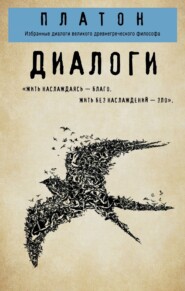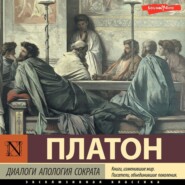По всем вопросам обращайтесь на: info@litportal.ru
(©) 2003-2025.
✖
The Republic
Настройки чтения
Размер шрифта
Высота строк
Поля
'Thou hast wronged me, O far-darter, most abominable of deities. Verily I would be even with thee, if I had only the power;'
or his insubordination to the river-god, on whose divinity he is ready to lay hands; or his offering to the dead Patroclus of his own hair, which had been previously dedicated to the other river-god Spercheius, and that he actually performed this vow; or that he dragged Hector round the tomb of Patroclus, and slaughtered the captives at the pyre; of all this I cannot believe that he was guilty, any more than I can allow our citizens to believe that he, the wise Cheiron's pupil, the son of a goddess and of Peleus who was the gentlest of men and third in descent from Zeus, was so disordered in his wits as to be at one time the slave of two seemingly inconsistent passions, meanness, not untainted by avarice, combined with overweening contempt of gods and men.
You are quite right, he replied.
And let us equally refuse to believe, or allow to be repeated, the tale of Theseus son of Poseidon, or of Peirithous son of Zeus, going forth as they did to perpetrate a horrid rape; or of any other hero or son of a god daring to do such impious and dreadful things as they falsely ascribe to them in our day: and let us further compel the poets to declare either that these acts were not done by them, or that they were not the sons of gods; – both in the same breath they shall not be permitted to affirm. We will not have them trying to persuade our youth that the gods are the authors of evil, and that heroes are no better than men – sentiments which, as we were saying, are neither pious nor true, for we have already proved that evil cannot come from the gods.
Assuredly not.
And further they are likely to have a bad effect on those who hear them; for everybody will begin to excuse his own vices when he is convinced that similar wickednesses are always being perpetrated by —
'The kindred of the gods, the relatives of Zeus, whose ancestral altar, the altar of Zeus, is aloft in air on the peak of Ida,'
and who have
'the blood of deities yet flowing in their veins.'
And therefore let us put an end to such tales, lest they engender laxity of morals among the young.
By all means, he replied.
But now that we are determining what classes of subjects are or are not to be spoken of, let us see whether any have been omitted by us. The manner in which gods and demigods and heroes and the world below should be treated has been already laid down.
Very true.
And what shall we say about men? That is clearly the remaining portion of our subject.
Clearly so.
But we are not in a condition to answer this question at present, my friend.
Why not?
Because, if I am not mistaken, we shall have to say that about men poets and story-tellers are guilty of making the gravest misstatements when they tell us that wicked men are often happy, and the good miserable; and that injustice is profitable when undetected, but that justice is a man's own loss and another's gain – these things we shall forbid them to utter, and command them to sing and say the opposite.
To be sure we shall, he replied.
But if you admit that I am right in this, then I shall maintain that you have implied the principle for which we have been all along contending.
I grant the truth of your inference.
That such things are or are not to be said about men is a question which we cannot determine until we have discovered what justice is, and how naturally advantageous to the possessor, whether he seem to be just or not.
Most true, he said.
Enough of the subjects of poetry: let us now speak of the style; and when this has been considered, both matter and manner will have been completely treated.
I do not understand what you mean, said Adeimantus.
Then I must make you understand; and perhaps I may be more intelligible if I put the matter in this way. You are aware, I suppose, that all mythology and poetry is a narration of events, either past, present, or to come?
Certainly, he replied.
And narration may be either simple narration, or imitation, or a union of the two?
That again, he said, I do not quite understand.
I fear that I must be a ridiculous teacher when I have so much difficulty in making myself apprehended. Like a bad speaker, therefore, I will not take the whole of the subject, but will break a piece off in illustration of my meaning. You know the first lines of the Iliad, in which the poet says that Chryses prayed Agamemnon to release his daughter, and that Agamemnon flew into a passion with him; whereupon Chryses, failing of his object, invoked the anger of the God against the Achaeans. Now as far as these lines,
'And he prayed all the Greeks, but especially the two sons of Atreus, the chiefs of the people,'
the poet is speaking in his own person; he never leads us to suppose that he is any one else. But in what follows he takes the person of Chryses, and then he does all that he can to make us believe that the speaker is not Homer, but the aged priest himself. And in this double form he has cast the entire narrative of the events which occurred at Troy and in Ithaca and throughout the Odyssey.
Yes.
And a narrative it remains both in the speeches which the poet recites from time to time and in the intermediate passages?
Quite true.
But when the poet speaks in the person of another, may we not say that he assimilates his style to that of the person who, as he informs you, is going to speak?
Certainly.
And this assimilation of himself to another, either by the use of voice or gesture, is the imitation of the person whose character he assumes?
Of course.
Then in this case the narrative of the poet may be said to proceed by way of imitation?
Very true.
Or, if the poet everywhere appears and never conceals himself, then again the imitation is dropped, and his poetry becomes simple narration. However, in order that I may make my meaning quite clear, and that you may no more say, 'I don't understand,' I will show how the change might be effected. If Homer had said, 'The priest came, having his daughter's ransom in his hands, supplicating the Achaeans, and above all the kings;' and then if, instead of speaking in the person of Chryses, he had continued in his own person, the words would have been, not imitation, but simple narration. The passage would have run as follows (I am no poet, and therefore I drop the metre), 'The priest came and prayed the gods on behalf of the Greeks that they might capture Troy and return safely home, but begged that they would give him back his daughter, and take the ransom which he brought, and respect the God. Thus he spoke, and the other Greeks revered the priest and assented. But Agamemnon was wroth, and bade him depart and not come again, lest the staff and chaplets of the God should be of no avail to him – the daughter of Chryses should not be released, he said – she should grow old with him in Argos. And then he told him to go away and not to provoke him, if he intended to get home unscathed. And the old man went away in fear and silence, and, when he had left the camp, he called upon Apollo by his many names, reminding him of everything which he had done pleasing to him, whether in building his temples, or in offering sacrifice, and praying that his good deeds might be returned to him, and that the Achaeans might expiate his tears by the arrows of the god,' – and so on. In this way the whole becomes simple narrative.
I understand, he said.
Or you may suppose the opposite case – that the intermediate passages are omitted, and the dialogue only left.
That also, he said, I understand; you mean, for example, as in tragedy.
You have conceived my meaning perfectly; and if I mistake not, what you failed to apprehend before is now made clear to you, that poetry and mythology are, in some cases, wholly imitative – instances of this are supplied by tragedy and comedy; there is likewise the opposite style, in which the poet is the only speaker – of this the dithyramb affords the best example; and the combination of both is found in epic, and in several other styles of poetry. Do I take you with me?
Yes, he said; I see now what you meant.
I will ask you to remember also what I began by saying, that we had done with the subject and might proceed to the style.
Yes, I remember.
In saying this, I intended to imply that we must come to an understanding about the mimetic art, – whether the poets, in narrating their stories, are to be allowed by us to imitate, and if so, whether in whole or in part, and if the latter, in what parts; or should all imitation be prohibited?

















